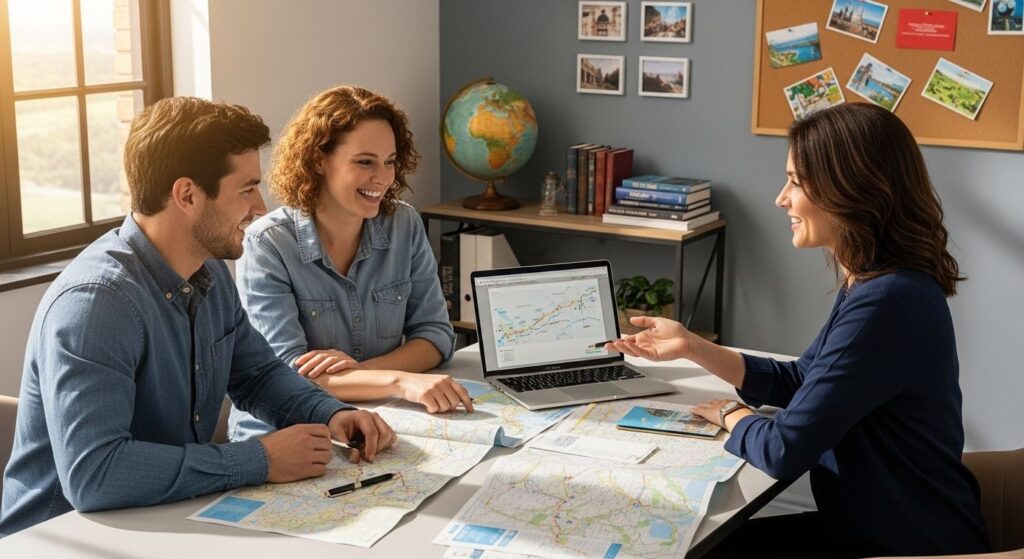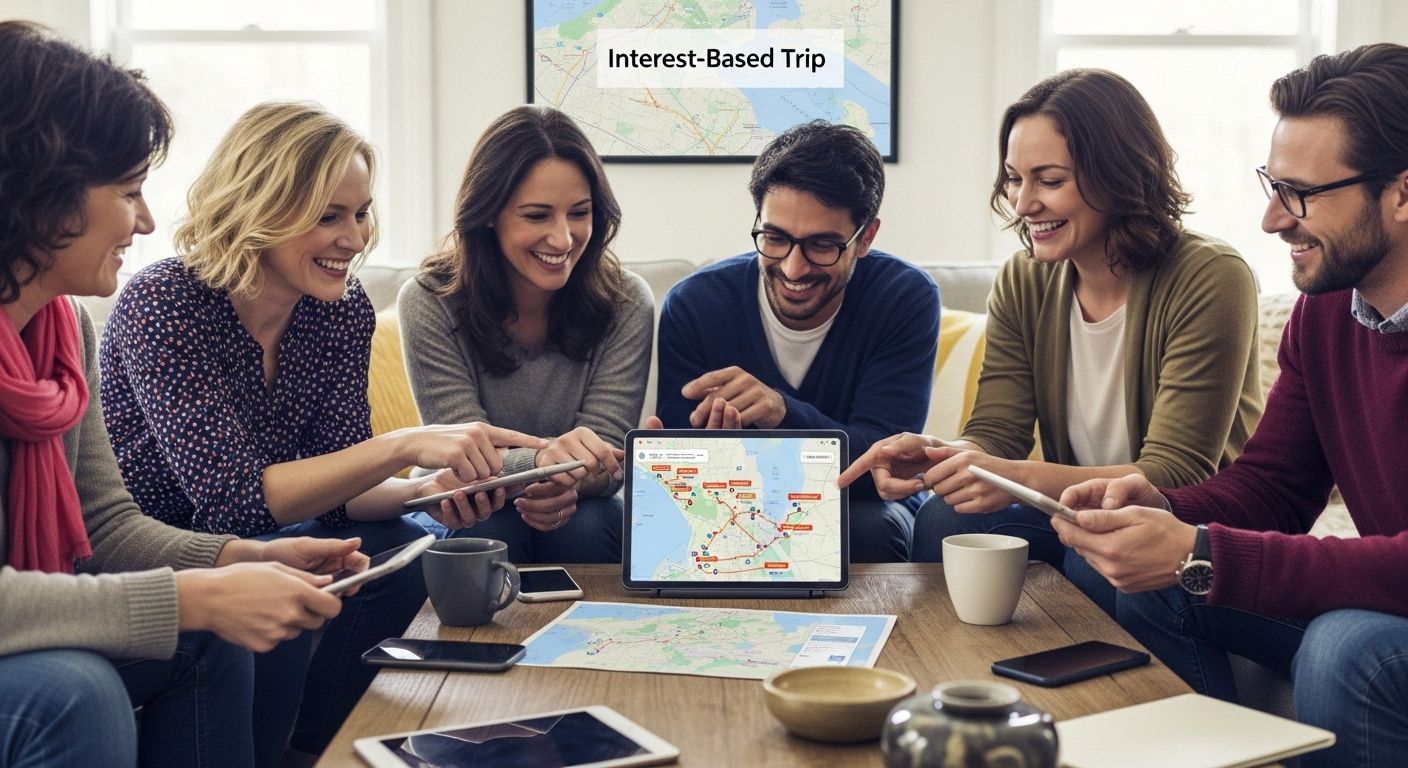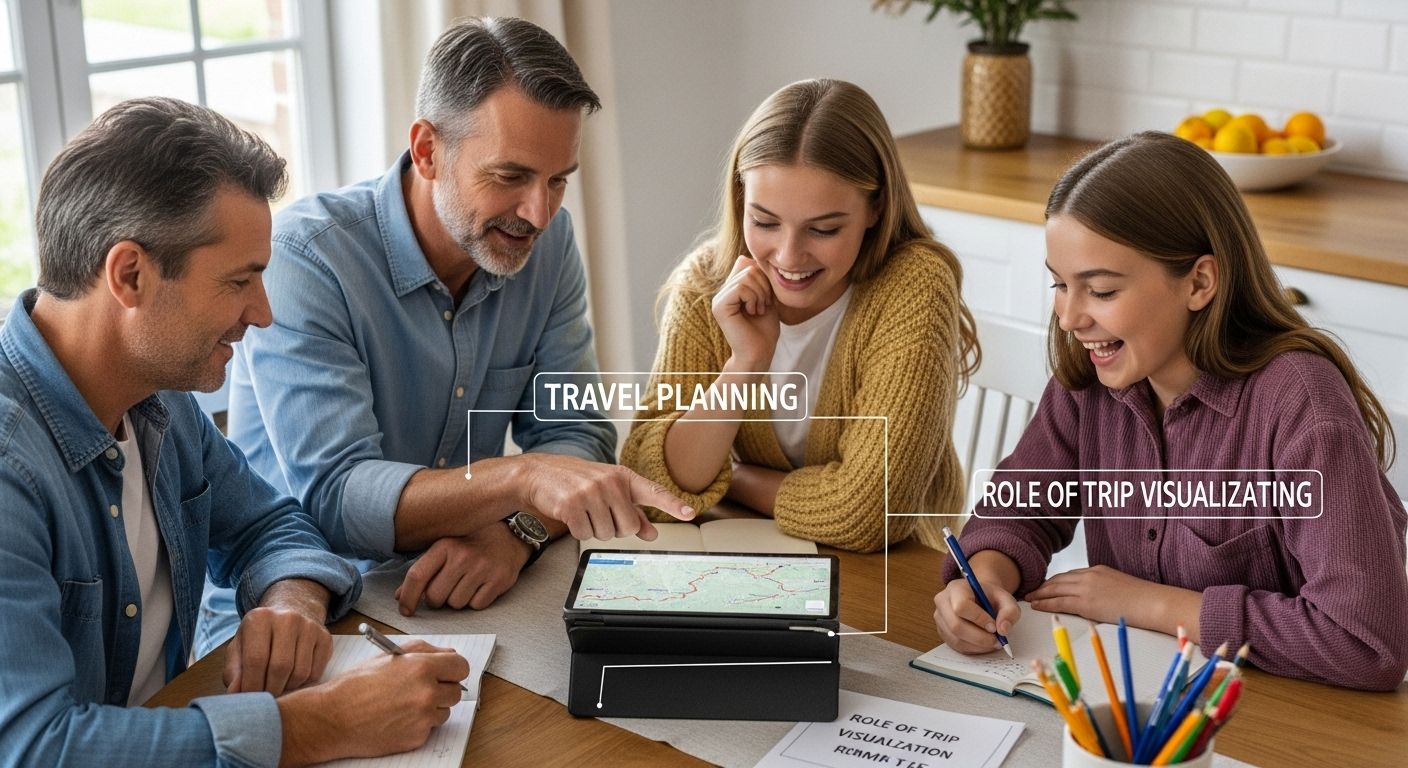Choosing the right travel planner can completely reshape your trip. Nearly 80 percent of travelers say personalized planning improves their travel satisfaction, according to recent surveys. Most people think picking a planner is just about comparing prices or reviews but that only scratches the surface. The real secret lies in how well the planner fits your unique style and needs and that can make all the difference between an ordinary trip and an unforgettable adventure.
Table of Contents
- Understand Your Travel Needs
- Research Different Travel Planners
- Check Reviews And Ratings
- Evaluate Planner Experience And Expertise
- Compare Pricing And Services Offered
- Look For Customization Options
- Establish Good Communication With Your Planner
Quick Summary
| Takeaway | Explanation |
|---|---|
| Understand your travel needs | Assess your personal travel style and preferences to find the best planner. |
| Research travel planners thoroughly | Evaluate different planners based on expertise, technology, and support offered. |
| Check reviews for reliability | Read authentic traveler feedback to gauge planners’ performance and service quality. |
| Evaluate planner expertise | Investigate qualifications and experience to ensure effective travel planning. |
| Communicate your expectations | Maintain clear and open dialogue with your planner to enhance coordination and results. |
1: Understand Your Travel Needs
Finding the best travel planner starts with a deep understanding of your personal travel requirements. Your unique travel style, preferences, and objectives will determine the most suitable planning approach. Before diving into selecting a travel planner, take time to assess your specific needs and travel goals.
Travel needs vary dramatically based on individual circumstances. According to the U.S. Department of State, travelers should carefully evaluate several key aspects before planning their journey:
-
Personal Travel Purpose: Business, leisure, adventure, family vacation, solo exploration
-
Travel Complexity: Domestic versus international destinations, number of locations, duration of trip
-
Budget Constraints: Spending limits, preferred accommodation types, transportation options
-
Comfort and Accessibility Requirements: Mobility needs, dietary restrictions, language preferences
A comprehensive self-assessment helps narrow down the type of travel planner that will work best for you. Some travelers need highly detailed, minute-by-minute itineraries, while others prefer flexible frameworks with room for spontaneity.
Consider your personal planning style. Are you someone who loves researching every detail, or do you prefer having someone else handle the logistics? Understanding this will guide you toward the right travel planning solution.
For travelers seeking a streamlined approach, learn more about our comprehensive trip planning guide that can help simplify your travel preparation process. By knowing yourself and your travel requirements, you’ll be better equipped to select a travel planner that transforms your trip from a potential stress point into an exciting adventure.
2: Research Different Travel Planners
Researching different travel planners requires a strategic and comprehensive approach. Not all travel planning solutions are created equal, and finding the right match demands careful evaluation of various platforms and services.
According to the Centers for Disease Control and Prevention, travelers should prioritize platforms with verifiable expertise and comprehensive resources. When researching travel planners, consider the following critical evaluation criteria:
-
Platform Functionality: Digital apps, online services, traditional agencies
-
Specialization Areas: Destination expertise, budget ranges, travel types
-
Technology Integration: Mobile compatibility, real-time updates, interactive features
-
Customer Support: Responsiveness, multilingual assistance, problem resolution capabilities
Start by exploring a mix of digital and traditional travel planning resources. Modern travelers have unprecedented access to tools ranging from sophisticated web applications to personalized travel agencies. Digital platforms often provide more flexibility and instant modifications, while traditional agencies might offer deeper personalized consultation.
Pay attention to user reviews, professional certifications, and independent ratings. Look for travel planners with transparent pricing structures, clear communication channels, and demonstrated track records of successful trip planning.
Check out our comprehensive guide to modern trip planning solutions to understand the evolving landscape of travel planning technologies. The key is finding a service that not only meets your logistical needs but also enhances your overall travel experience through intuitive design and reliable support.
3: Check Reviews and Ratings
Reviews and ratings are critical tools for evaluating the reliability and performance of travel planners. They provide real-world insights from travelers who have already experienced the service, offering an unfiltered perspective beyond marketing materials.
According to Pew Research Center, most consumers rely on online reviews to make informed decisions about services. When examining travel planner reviews, focus on several key evaluation aspects:
-
Consistency of Positive Experiences: Look for patterns in traveler feedback
-
Specific Problem Resolution: How effectively does the travel planner handle unexpected challenges
-
Communication Quality: Responsiveness and clarity of interactions
-
Value for Money: Balance between service cost and delivered results
Authentic reviews typically reveal nuanced details about a travel planner’s actual performance. Professional review platforms, specialized travel forums, and independent consumer websites offer comprehensive feedback. Do not rely exclusively on testimonials featured directly on a company’s website, as these might be curated or selectively presented.
Seek out reviews that provide specific examples and detailed explanations. A review stating “They saved me thousands and handled a complex international trip perfectly” carries more weight than a generic “Great service” comment.
Pay attention to how travel planners respond to negative reviews. Transparent, professional, and solution-oriented responses indicate a company’s commitment to customer satisfaction. Platforms that demonstrate accountability and actively work to address customer concerns stand out in the competitive travel planning market.
Explore our expert tips on interpreting travel service reviews to become a more discerning consumer. Remember, thorough research today can prevent potential travel planning headaches tomorrow.
4: Evaluate Planner Experience and Expertise
Expertise is the cornerstone of exceptional travel planning. When selecting a travel planner, their depth of knowledge and professional background become crucial determining factors in your trip’s potential success.
According to the National Endowment for Democracy, assessing professional credentials requires examining several critical components. Travelers should investigate a planner’s qualifications through the following key indicators:
-
Professional Certifications: Travel industry credentials and specialized training
-
Destination Knowledge: Proven understanding of specific geographic regions
-
Years of Active Experience: Consistent track record in travel planning
-
Specialized Travel Niches: Expertise in specific types of travel experiences
Professional travel planners distinguish themselves through comprehensive knowledge and proven problem-solving skills. Look beyond surface-level marketing materials and seek verifiable evidence of their capabilities. Request detailed information about their professional background, including years of industry experience, notable client projects, and specific areas of specialization.
Consider the depth and breadth of their travel network. Experienced planners typically have established relationships with airlines, hotels, tour operators, and local guides. These connections can translate into unique opportunities and potential cost savings for your travel experience.
Digital platforms and traditional agencies alike should demonstrate transparent communication about their team’s qualifications. Reputable travel planners will willingly share professional credentials and client testimonials that validate their expertise.
Discover advanced strategies for selecting top-tier travel planning professionals to ensure you partner with a truly exceptional service. The right expertise can transform a good trip into an extraordinary journey.
5: Compare Pricing and Services Offered
Pricing transparency and comprehensive service offerings are critical factors in selecting the right travel planner. Understanding the financial structure and included services helps travelers make informed decisions that align with their budget and expectations.
According to Elliott Research, travel planning services have diverse pricing models that can significantly impact your overall travel experience. When comparing pricing and services, focus on these essential evaluation criteria:
-
Fee Structures: Flat rates, percentage-based fees, hourly consultation charges
-
Included Services: Trip research, booking, emergency support, personalized recommendations
-
Additional Costs: Hidden fees, service charges, cancellation penalties
-
Value-Added Services: Travel insurance, visa assistance, detailed itinerary planning
Professional travel planners typically offer tiered service packages, ranging from basic consultation to comprehensive, end-to-end trip management. Some charge consultation fees starting around $250, while others earn commissions from service providers. The key is understanding exactly what you receive for your investment.
Carefully review the detailed breakdown of services. A lower-priced option might seem attractive, but it could lack critical support features like 24/7 emergency assistance or personalized travel recommendations. Conversely, a slightly more expensive service might provide substantial added value through comprehensive planning and dedicated support.
Pay attention to the flexibility of pricing models. Some travel planners offer modular services, allowing you to customize your package based on specific needs. This approach can provide more cost-effective solutions compared to one-size-fits-all pricing structures.
Explore our comprehensive guide to understanding travel planning service pricing to make a more informed decision. Remember, the cheapest option is not always the most economical in the long run.
6: Look for Customization Options
Customization transforms a generic travel plan into a personalized journey that reflects your unique preferences and requirements. The most exceptional travel planners understand that one-size-fits-all approaches rarely satisfy individual traveler needs.
According to the Institute on Community Integration, personalized travel planning is essential for creating meaningful experiences. When evaluating customization options, consider these critical factors:
-
Personal Interest Alignment: Matching activities with individual preferences
-
Flexibility in Itinerary Design: Ability to modify and adjust travel plans
-
Accommodation Preferences: Options for different travel styles and comfort levels
-
Dietary and Accessibility Requirements: Tailored solutions for specific needs
Advanced travel planners leverage technology to provide granular personalization. Look for platforms that offer interactive planning interfaces where you can drag and drop activities, adjust timelines, and receive intelligent recommendations based on your specific interests.
Technology has revolutionized travel customization. Modern travel planning tools can analyze your previous travel history, social media preferences, and stated interests to generate highly personalized recommendations. This means your travel plan becomes more than a generic route it becomes a curated experience tailored specifically to you.
The best customization goes beyond surface-level preferences. It considers factors like your travel pace, comfort with spontaneity, budget constraints, and even your energy levels during different times of the day. A truly personalized travel plan anticipates your needs before you even articulate them.
Discover how intelligent travel planning can transform your next adventure and unlock experiences perfectly aligned with your individual travel style. Customization is not just a feature it is the future of travel planning.
7: Establish Good Communication with Your Planner
Effective communication is the backbone of successful travel planning, transforming a transactional service into a collaborative journey. Your ability to clearly articulate expectations and maintain open dialogue will significantly impact the quality of your travel experience.
The foundation of strong communication involves establishing clear channels and expectations from the initial consultation. Be prepared, specific, and transparent about your travel goals, preferences, and potential constraints. This means going beyond generic statements and providing detailed insights into your travel vision.
Effective communication encompasses several critical elements:
-
Clear Articulation: Precise description of travel expectations
-
Responsive Interaction: Timely replies and proactive updates
-
Documentation: Keeping written records of discussions and agreements
-
Feedback Mechanism: Constructive dialogue about trip planning progress
Professional travel planners appreciate clients who communicate with clarity and purpose. They want to understand not just where you want to go, but why you want to go there. Share personal stories, travel motivations, and specific experiences that have shaped your travel desires.
Utilize multiple communication platforms to maintain consistent contact. Many modern travel planners offer video consultations, messaging apps, email communication, and sometimes even dedicated client portals. Choose the methods that work best for both you and your planner.
Remember that communication is a two-way street. While you should be clear about your needs, also remain open to professional recommendations. Experienced travel planners often have insights and suggestions that can elevate your travel experience beyond your initial expectations.
Learn advanced strategies for effective travel planning communication to ensure a smooth, enjoyable planning process. The right communication approach can turn a good trip into an extraordinary adventure.
Below is a comprehensive table summarizing the 7 key tips, main evaluation points, and benefits covered in the article to help you find the best travel planner for your needs.
| Tip / Step | Key Points & Actions | Main Benefits & Outcomes |
|---|---|---|
| 1. Understand Your Travel Needs | Assess your personal travel style, goals, itinerary complexity, budget, and any specific requirements before searching for a planner. | Identifies the right planner tailored to your preferences |
| 2. Research Different Travel Planners | Explore digital apps and traditional agencies; evaluate functionality, specialization, technology integration, and customer support. | Matches you with a platform/agency that fits your travel type |
| 3. Check Reviews and Ratings | Examine consistency of feedback, problem resolution, communication quality, and value for money on independent platforms. | Helps avoid unreliable planners and ensures quality |
| 4. Evaluate Planner Experience and Expertise | Investigate credentials, years in the industry, destination knowledge, and specialized travel niches. | Ensures informed, expert trip planning |
| 5. Compare Pricing and Services Offered | Review fee structures, service inclusions (like emergency support), and look for value-added services and pricing transparency. | Avoids hidden fees; gets best value for your investment |
| 6. Look for Customization Options | Assess how well planners allow for personalization, dynamic itineraries, accommodating interests, and special requirements (diet, accessibility, etc.). | Delivers a truly personalized travel experience |
| 7. Establish Good Communication with Planner | Maintain clear, specific, and open dialogue; use multiple platforms; give and receive feedback throughout planning. | Achieves smooth collaboration and better trip outcomes |
Make Stress-Free Trip Planning a Reality with Yopki
You have just read how planning the perfect trip can feel overwhelming. Sorting through endless reviews, searching for a reliable planner, and struggling with complicated itineraries steal time and drain your excitement. The article highlights the frustration of managing multiple details while wishing for a more personal, flexible way to organize your travels. If you want a solution that actually reflects your style, pace, and preferences and ends the confusion described in the “7 Tips for Finding the Best Travel Planner,” Yopki is ready to help.

Why wait and let stress control your travels? With Yopki, you instantly get a personalized itinerary tailored just for you. Enjoy a smart map that streamlines each day and a drag-and-drop calendar that lets you adjust any plan in seconds. Say goodbye to scattered confirmations and hello to everything in one place. If you want step-by-step support, our AI Travel Concierge and booking team are always a click away. Take the next step toward a smooth, exciting adventure and see how easy travel planning can be. Visit Yopki now and turn preparation into pure anticipation.
Frequently Asked Questions
How do I determine my travel needs before choosing a planner?
Understanding your travel needs involves assessing your travel style, preferences, and objectives, including the purpose of your trip, budget constraints, and any special requirements.
What should I look for when researching different travel planners?
When researching travel planners, consider their platform functionality, specialization areas, technology integration, and the responsiveness of their customer support to ensure a good match for your needs.
Why are reviews and ratings important when selecting a travel planner?
Reviews and ratings provide real-world insights from previous clients and highlight the planner’s reliability, problem-solving capabilities, and overall communication quality, helping you make an informed choice.
How can I establish good communication with my travel planner?
Establish effective communication by being clear and specific about your travel goals, maintaining timely responses, documenting discussions, and providing constructive feedback throughout the planning process.



